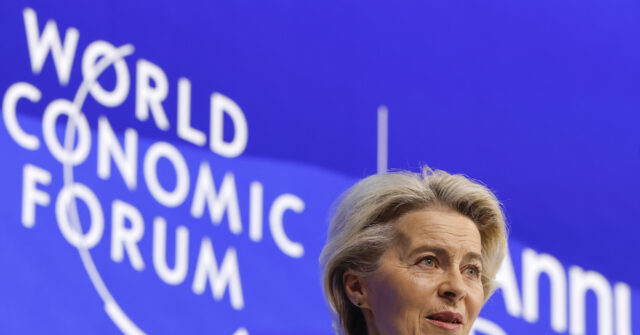At the opening of the annual World Economic Forum meeting in Davos, Switzerland, European Commission President Ursula von der Leyen called for increased cooperation between governments and private businesses to enact tech censorship in the face of “industrial scale disinformation”.
Following in the example of WEF Chairman Klaus Schwab’s ‘Global Risk Report’, EU chief Ursula von der Leyen used her address in Davos on Tuesday to highlight the supposed risks of allowing the free flow of information in light of the alleged threat of “disinformation and disinformation”.
“These risks are serious because they limit our ability to tackle the big global challenges we are facing: changes in our climate – and our geopolitical climate; shifts in our demography and in our technology; spiralling regional conflicts and intensified geopolitical competition and their impacts on supply chains,” she said.
The EU chief therefore called for governments and private firms to form a “new connective tissue” to “deliver the solutions we need, to fight threats like climate change or industrial-scale disinformation.”
Mrs von der Leyen said that the need to combat disinformation is “more important than ever” given that 2024 will be the largest election year in the history of the world, with 41 per cent of the global population, an estimated 3.2 billion people — including more than 450 million in the EU — set to head to the polls this year.
“Like in all democracies, our freedom comes with risks. There will always be those who try to exploit our openness, both from inside and outside. There will always be attempts to push us off track, for example with disinformation and misinformation,” she said.
Climate change or industrial-scale disinformation are global threats.
Governments hold many levers, but businesses have the innovation, tech and talent to deliver solutions.
To innovate, invest and compete, they rely on openness and freedom.
So strengthening our democracies… pic.twitter.com/Bth4p2Uylf— Ursula von der Leyen (@vonderleyen) January 16, 2024
Despite left-wing globalists often touting themselves as the stewards of democracy, this appears to only apply so long as citizens vote the way they want. Indeed, longtime Eurocrat Guy Verhofstadt declared following Donald Trump’s sweeping victory in the Iowa caucuses on Monday that “democracy fighting for survival” and warned: “Window closing for Europe too!”
Much like in the United States, where voters are increasingly dissatisfied with the globalist governance of President Joe Biden, there has been a groundswell of support for populism in Europe, where right-wing parties are expected to make significant gains in the June European Parliament elections.
Yet, similarly to the attempts to block Trump from the ballot by left-wing legal activists, there has also been calls in Germany, for example, to ban the surging populist right-wing Alternative for Germany (AfD) party to “protect” democracy from the voters.
Going into the election year, Brussels will have also have more censorship powers at its disposal than ever. The EU president highlighted the Digital Services Act (DSA) instituted by Brussels at the end of 2022 and is set to come into full force next month. The DSA vastly expanded the censorship powers of the European Union to police so-called ‘hate speech’ and disinformation.
Starting in February, social media companies and websites will face fines of up to six per cent of their global revenue if they fail to comply with the speech restrictions. In addition, platforms also face the possibility of being banned entirely from the bloc under the new regulation.
“We defined the responsibilities of large internet platforms on the content they promote and propagate. A responsibility to children and vulnerable groups targeted by hate speech but also a responsibility to our societies as a whole,” von der Leyen said.
WEF: United States Will Soon Make Hate Speech Illegal, Says EU Commissioner https://t.co/lNvK4gUnFD
— Breitbart London (@BreitbartLondon) January 19, 2023


